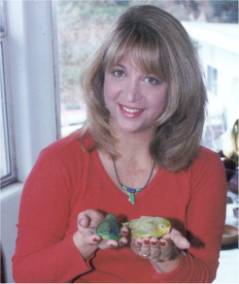Hi,
I have to say that I read your blog and it is very informative. I have two parrotles-one male and the other female. For the first year I had them they were fine and caged together. They are very bonded together and close. Both are around 2 years old and I got them at 10 months old. After a year the male started plucking the female around the neck and on the back. I had to separate them and I only separate them during the day when they don't play together or eat together. At night I don't separate them because they call for eachother and the male finds it hard to settle down and sleep without the female-as they snuggle together. I tried more shredding toys, more playtime, and it seemed to help the plucking problem a bit, but I still cannot keep them together during the day. Do you think it is bordom, hormones? Or both maybe. they play together during the day when I can watch them and they have a ball together. They are really two peas in a pod and love eachother otherwise. I put their two cages close together. I also give them plenty of fresh food, they like quinquoa, sprouts, and I give them Goldenfeast, and Volkmans seed-no pellets. Any advice would be appreciated. I just love them so as they are such sweet adorable birds. The avian vet seems at a loss as I don't think they are that knowledgable about parrotlets I have to say.
Shelley
Dear Shelley:
Thank you for your email. Actually, the behavior of your birds is quite normal and one of the reasons I never recommend getting two parrotlets of the opposite sex and keeping them in same cage unless you are going to breed them. You take two healthy adult birds of the opposite sex give them good food, a secure environment and they will do what Nature designed them to do – which is breed. Your male’s behavior is what most breeders of parrotlets refer to as ‘foreplay’ but since your birds are not set up for breeding, they are behaving abnormally. This can result in continued feather destructive behavior or worse things like aggression which can lead to injury or even death. The calling to one another is bonding and what all flock members to – after all, birds are flock animals and they do call to one another when they roost at night. This is about survival and safety in numbers not emotional bonding that we humans like to think it is.
So you have decide what you want to do with these birds. If you want them to stay pets, then they will have to stay in separate cages and when out together be supervised. If you want them to breed, you will lose them as pets and you will need to set them up for breeding and leave them alone. Unfortunately, parrotlets are not domesticated birds like budgies or cockatiels – they are very much wild animals whose behavior is influenced by instinct not behavior that has been influenced by human imprinting. As for this being parrotlet behavior, absolutely not true. This is true for almost all species of parrot – if these were two adult macaws, it would be the same thing.
Hope this helps.
Sincerely yours,
Sandee L. Molenda, C.A.S.
The Parrotlet Ranch, Owner, www.parrotletranch.com
Join the International Parrotlet Society, – the World’s Largest and Oldest Parrotlet Organization www.internationalparrotletsociety.org
A Chattering Bird Builds No Nest.
Camaroonian Phrase
Thursday, February 10, 2011
Plucking Parrotlet Pair
Subscribe to:
Post Comments (Atom)




No comments:
Post a Comment
Note: Only a member of this blog may post a comment.